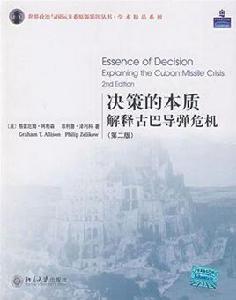內容介紹
這是第二次世界大戰後最有影響力的政治學著作之一。《決策的本質》原作以獨特的視角審視了冷戰時期的關鍵事件。此經典著作的第二版不僅僅是修訂,更是重寫:重新解釋了古巴飛彈危機前後的理論及事件;也融入了甘迺迪錄音帶及最近解密的蘇聯檔案的信息。第二版提煉了原著中格雷厄姆·阿利森任美國助理國防部長及哈佛大學甘迺迪政府學院院長時期的一些評論和觀點。同時也有一位新的作者菲利普·澤利科參與了第二版的撰寫,他著有十分暢銷的評論著作《甘迺迪錄音帶》(The Kennedy Tapes,Harvard University Press,1 997)。 《決策的本質》(第二版)鮮活地展現了重壓之下的決策過程,此書也是唯一一部嘗試解決這一經久不衰的問題的著作:人們如何理解政府的舉動?
作者介紹
作者簡介
格雷厄姆·阿利森(Graham T.Allison),哈佛大學甘迺迪政府學院院長、教授,曾在柯林頓政府時期任助理國防部長。
作品目錄
Preface
Introduction
1 Model I: The Rational Actor
A Rigorous Model of Action
A Rational Actor Paradigm
The Classical Model Illustrated
Classical Realism. Neorealism (Structural Realism).
International Institutionalism. Liberalism. Strategy, War,
and Rational Choice.
Variants and Uses of the Classical Model
2 The Cuban Missile Crisis: A First Cut
Why Did the Soviet Union Decide to Place Offensive Missiles in
Cuba?
Hypothesis 1: Cuban Defense. Hypothesis 2: Cold War Politics.
Hypothesis 3: Missile Power. Hypothesis 4: Berlin——Win,
Trade, or Trap.
Why Did the United States Respond to the Missile Deployment
with a Blockade?
Alternative I: Do Nothing. Alternative 2: Diplomatic
Pressures. Alternative 3: A Secret Approach to Castro.
Alternative 4: Invasion. Alternative 5: Air Strike.
Alternative 6: Blockade.
Why Did the Soviet Union Withdraw the Missiles?
3 Model II: Organizational Behavior
Organizational Logic and Efficiency
Organizational Logic and Organizational Culture
Interactive Complexity
NASA: Hero and Goat
Organizational Behavior Paradigm
4 The Cuban Missile Crisis: A Second Cut
Deployment of Soviet Missiles in Cuba
The Soviet Build-up in Detail. Organizational
Implementation.
Imposition of a U.S. Blockade of Cuba
Organizational Intelligence. Organizational Options.
Organizational Implementation.
The Withdrawal of Soviet Missiles from Cuba
5 Model III: Governmental Politics
The Governmental Politics Model Illustrated __
1. Separated Institutions Sharing Power. 2. The Power to
Persuade. 3. Bargaining According to the Processes. 4. Power
Equals Impact on Outcome. 5. Intranational and
International Relations.
Group Processes and Their Effects on Choices and Action
1. Better Decisions. 2. The "Agency" Problem: Principals,
Agents, and Players. 3. Participants: Who Plays? 4. Decision
Rules. 5. Framing Issues and Setting Agendas. 6. Groupthink.
7. Complexity of ]oint Action.
A Governmental Politics Paradigm
6 The Cuban Missile Crisis: A Third Cut
The Imposition of a Blockade by the United States
The Politics of Discovery. The Politics of Choice.
Soviet Withdrawal of the Missiles from Cuba
Soviets Kill an American U-2 Pilot. The President and the
Chairman. The "Deal": Resolving the Turkish Problem.
The "Deal": Resolving the Cuban Problem.
7 Conclusion
Summing Up: Differences in Interpretation
Summing Up: Different Answers or Different Questions?
Where Do We Go from Here?
Index

